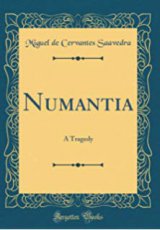The Siege of Numantia Page #22
The Siege of Numantia is a tragedy by Miguel de Cervantes set at the siege of Numantia. The play is divided into four acts. The dialogue is sometimes in tercets and sometimes in redondillas, but for the most part in octaves.
Y ansi las ninfas fugitivas sueltas, De que está el verde prado y bosque lleno, Vengan humildes á tus aguas claras Y en prestarte favor no sean avaras: "Que prestes á mis asperos lamentos Atento oido, ó que á escucharlas vengas, Y aunque dexes un rato tus contentos, Suplicote que en nada te detengas: Si tu con tus continuos crecimientos Destos fieros Romanes no me vengas, Cerrado veo ya qualquier camino A la salud del pueblo Numantino." This famous river (the Durius of the Romans) we prefer calling, in Portuguese fashion, the Douro, as being a name more familiar to English ears, and more amenable, too, to the laws of rhythm. NOTE 6, PAGE 22. And, forcing way into the Vatican. The event here alluded to is the fearful sack of Rome, in 1527, perpetrated by a portion of the army of Charles V. under the command of the Constable de Bourbon, when the Pope took refuge, and was besieged, in the castle of St. Angelo. The "Pilot of the Sacred Bark" was Clement VII. NOTE 7, PAGE 23. The great Albano he. This is a poetical name for Fernando Alvarez de Toledo, the Duke of Alva, who was famous for many things and infamous for more. The exploit referred to is the siege of Rome by Alva, after the battle of St. Quentin, 1557, when the French, who were allies of Pope Paul IV. against the Spaniards, had to leave Italy to save their own capital and country. In the time of Cervantes, no doubt, this siege was looked upon with pride as a "brandishing of the Spanish knife above the Roman neck," but in the light of history we see nothing more than a mock siege, a mock defence, and a mock withdrawal. Alva's hands were thoroughly fettered by his devout master, Philip II., who feared to humiliate the Pope too much, lest he should lose his title of "Most Catholic Majesty." This event is narrated with sarcastic brevity by Motley in the third book of his "History of the Netherlands." NOTE 8, PAGE 23. The second Philip, second yet to none. No doubt Philip II., at this period, had more power in his hand than had ever been held by a purely Spanish king. Motley, in his characteristic way, thus sums up his many titles: "He was king of all the Spanish kingdoms, and of both the Sicilies. He was titular king of England, France, and Jerusalem. He was 'Absolute Dominator' in Asia, Africa, and America. He was Duke of Milan, and both the Burgundies, and Hereditary Sovereign of the Seventeen Netherlands." To all this mighty inheritance he himself added the crown of Portugal. Cervantes took a part, maimed as he was, in this conquest, and it is, therefore, with legitimate pride that he speaks of the "Lusitanian banner that had been knit anew to the stately robes of Castile." Sixty years, however, sufficed to tear it asunder again. What Cervantes thought of Philip as a man and a ruler we can only conjecture. Twelve years after, in 1598, when the life of this monster of cruel bigotry had come to an end, and pompous funeral rites were everywhere being celebrated, we find Cervantes standing in the cathedral of Seville gazing on the astounding catafalque raised in honour of the deceased, and reciting with a roguish air that famous sonnet of his, beginning, "I vow to God this grandeur stuns my brain!" This sonnet, which Cervantes prized as the prime honour of his writings (honra principal de mis escritos), and which his countrymen regard as a model of exquisite raillery, was certainly not intended to do honour to the dead. Philip was no friend of poets, players, or outspoken thinkers, and literature breathed again when he expired. For a translation of the sonnet, see Gibson's translation of the "Journey to Parnassus," p. 375. NOTE 9, PAGE 51. The Body. Ticknor, who is certainly not over-lavish at any time in his praise of Cervantes, declares that the incantations of Marquino surpass in dignity those of the Faustus of Marlowe, who was a contemporary of Cervantes. He also affirms, that not even Shakespeare, when he presents on the stage the armed head raised up, under constraint, to reply to the criminal enquiries of Macbeth, excites so much our sympathy and horror as does Cervantes with that tormented spirit, which returns to life only to suffer a second time the pangs of dissolution and death. We give here the original of the speech of the resuscitated corpse, which Bouterwek describes as terrific:-- EL CUERPO. Cese la furia del rigor violento Tuyo, Marquino; baste, triste, baste La que yo paso en la region escura, Sin que tu crezcas mas mi desventura. Engañaste si piensas que recibo Contento de volver á esta penosa, Misera y corta vida que ahora vivo, Que ya me va faltando presurosa; Antes me causas un dolor esquivo, Pues otra vez la muerte rigurosa Triunfará de mi vida y de mi alma Mi enemigo tendrá doblada palma. El cual, con otros del escuro bando De los que son sujetos á aguardarte, Está con rabia en torno aqui esperando A que acabe, Marquino, de informarte Del lamentable fin, del mal nefando Que de Numancia puedo asegurarte, La cual acabará a las mismas manos De los que son á ella mas cercanos. Throughout this scene, the pompous solemnity of the regular priests and the mock-heroic fury of Marquino are cleverly contrasted. Cervantes, who from his readings was familiar with all sorts of wizards and enchanters, makes Marquino a kind of old-world Merlin, kept, however, under necessary tragic restraint. The time had not yet come for the humours of "Don Quixote." NOTE 10, PAGE 65. Sons of mothers, sad in lot. This spirited speech of one of the Numantine wives has the true Spartan ring in it, of which our translation is but a feeble echo. We give the most effective part of it in the original:-- Hijos destas tristes madres, Qué es esto? Como no hablais? Y con lagrimas rogais Que no os dexen vuestros padres? Basta, que la hambre insana Os acabe con dolor, Sin esperar el rigor De la aspereza Romana. Decildes que os engendraron Libres, y libres nacistes, Y que vuestras madres tristes Tambien libres os criaron. Decildes que pues la suerte Nuestra va tan de caida, Que como os dieron la vida, Ansi mismo os den la muerte. O muros desta ciudad, Si podeis hablad, decid, Y mil veces repetid: Numantinos, libertad! NOTE 11, PAGE 69. Cause that these wretched Romans. The morale of the tragedy as a whole is so perfect, and the character of Theogenes, as represented, is so noble and chivalrous, that this savage decree of his seems strange and out of keeping. There are, it is true, more brutal things presented in "Titus Andronicus," but that is hardly a model of tragic dignity and decorum. The Latin historians tell us that when the crisis arrived the Numantine citizens ate raw flesh, and drugged themselves with a liquor called Celia, to madden themselves for the unnatural slaughter; but, artistically speaking, there was no necessity to give such things prominence especially in the mouth of Theogenes.
Translation
Translate and read this book in other languages:
Select another language:
- - Select -
- 简体中文 (Chinese - Simplified)
- 繁體中文 (Chinese - Traditional)
- Español (Spanish)
- Esperanto (Esperanto)
- 日本語 (Japanese)
- Português (Portuguese)
- Deutsch (German)
- العربية (Arabic)
- Français (French)
- Русский (Russian)
- ಕನ್ನಡ (Kannada)
- 한국어 (Korean)
- עברית (Hebrew)
- Gaeilge (Irish)
- Українська (Ukrainian)
- اردو (Urdu)
- Magyar (Hungarian)
- मानक हिन्दी (Hindi)
- Indonesia (Indonesian)
- Italiano (Italian)
- தமிழ் (Tamil)
- Türkçe (Turkish)
- తెలుగు (Telugu)
- ภาษาไทย (Thai)
- Tiếng Việt (Vietnamese)
- Čeština (Czech)
- Polski (Polish)
- Bahasa Indonesia (Indonesian)
- Românește (Romanian)
- Nederlands (Dutch)
- Ελληνικά (Greek)
- Latinum (Latin)
- Svenska (Swedish)
- Dansk (Danish)
- Suomi (Finnish)
- فارسی (Persian)
- ייִדיש (Yiddish)
- հայերեն (Armenian)
- Norsk (Norwegian)
- English (English)
Citation
Use the citation below to add this book to your bibliography:
Style:MLAChicagoAPA
"The Siege of Numantia Books." Literature.com. STANDS4 LLC, 2024. Web. 25 Nov. 2024. <https://www.literature.com/book/the_siege_of_numantia_60>.




Discuss this The Siege of Numantia book with the community:
Report Comment
We're doing our best to make sure our content is useful, accurate and safe.
If by any chance you spot an inappropriate comment while navigating through our website please use this form to let us know, and we'll take care of it shortly.
Attachment
You need to be logged in to favorite.
Log In